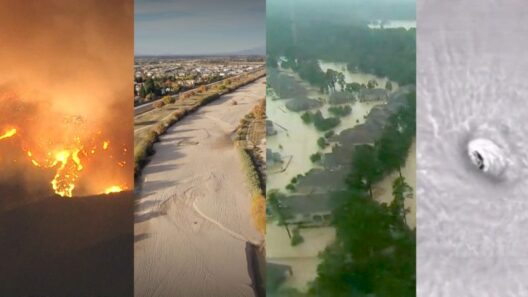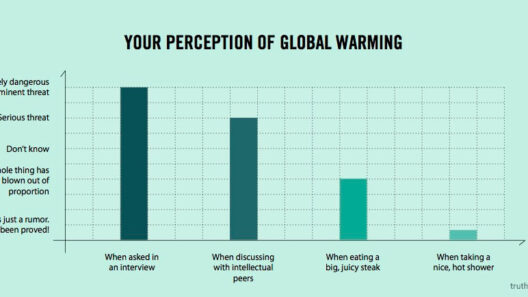In recent decades, the burgeoning evidence surrounding anthropogenic climate change has become irrefutable. It stands as a clarion call for action, illuminating the undeniable impact of human activities on our planet’s climate systems. At the heart of this discussion lies the critical examination of how our industrial, agricultural, and urban practices serve as a double-edged sword, contributing significantly to the inexorable rise in global temperatures.
The phenomenon of global warming can largely be attributed to the enhanced greenhouse effect, a process wherein certain gases trap heat within the Earth’s atmosphere. This is a natural occurrence; however, human activities have exacerbated this effect by emitting excessive quantities of greenhouse gases, notably carbon dioxide (CO₂) and methane (CH₄). These emissions originate primarily from fossil fuel combustion, deforestation, and agricultural practices. Understanding the roots of these emissions is vital for comprehending our fingerprints on the planet.
One of the most significant contributors to global warming is the burning of fossil fuels, which are the lifeblood of modern civilization. Coal, oil, and natural gas power our vehicles, heat our homes, and fuel our industries. The combustion of these fossil fuels releases vast amounts of CO₂ into the atmosphere. In fact, energy-related activities account for approximately 73% of global greenhouse gas emissions. As developing nations industrialize and populations surge, the reliance on these energy sources shows no signs of abating. Transitioning to renewable energy sources like solar, wind, and hydroelectric power is essential in mitigating this trend.
Moreover, deforestation stands as another significant modifier of our climate. Forests act as carbon sinks, absorbing more CO₂ than they emit. When trees are felled for timber or to clear land for agriculture, the stored carbon is released, further contributing to the greenhouse gas concentration in the atmosphere. The Amazon rainforest, often termed the “lungs of the Earth,” has been subjected to rampant deforestation. Its destruction not only contributes to climate change but also leads to biodiversity loss and habitat destruction.
The agricultural sector also plays a pivotal role in climate change. The methods employed in modern agriculture, especially intensive farming, contribute to greenhouse gas emissions through methane and nitrous oxide. Methane is emitted during the digestive processes of livestock and from manure management. Additionally, the use of nitrogen-based fertilizers releases nitrous oxide, which has a potency as a greenhouse gas many times that of CO₂. Sustainable agricultural practices, including crop rotation, agroforestry, and reduced fertilizer use, can help mitigate these emissions while maintaining food security.
Urbanization is yet another facet of human activity that has profound implications for climate. As populations migrate to urban centers, the demand for energy rises, leading to increased fossil fuel consumption. Urban heat islands—cities retaining heat due to their extensive concrete surfaces—exacerbate local temperatures, creating a feedback loop that further drives climate change. Transitioning to green infrastructures, such as green roofs and urban forests, can alleviate some of these pressures by enhancing carbon sequestration and reducing heat absorption.
Additionally, the impact of waste management practices cannot be overlooked. Landfills produce methane during the decomposition of organic waste, contributing significantly to greenhouse gas emissions. Alternative strategies, such as composting and recycling, can reduce the waste that ends up in landfills, subsequently minimizing methane emissions. Public policy and education aimed at promoting responsible waste management are paramount in addressing these issues.
Understanding the interconnectedness of these factors offers a clearer view of how to combat climate change. The urgency to act is underscored by scientific consensus. Not only do our actions drive climate change, but they also lead to significant repercussions, including extreme weather events, sea-level rise, and biodiversity loss. These changes have severe implications for human health, livelihoods, and ecosystems. The disparities in climate impacts also exacerbate existing inequalities—often the most vulnerable populations, who contribute the least to emissions, suffer the most from climate-related disasters.
To address the myriad challenges posed by climate change, a multifaceted approach is necessary. Policies aimed at reducing greenhouse gas emissions must be implemented on a local, national, and global scale. International agreements, such as the Paris Agreement, represent collective efforts to limit global temperature rise and facilitate sustainable development. However, real change demands grassroots movements advocating for environmental stewardship, individual accountability, and corporate responsibility.
In tandem with policy initiatives, education plays a crucial role in shaping public perception and fostering a culture of sustainability. Awareness campaigns can mobilize communities to adopt environmentally friendly practices, reduce energy consumption, and advocate for climate action from decision-makers. By promoting an understanding of the climate crisis and the imperative for sustainable practices, individuals can become empowered agents of change.
In conclusion, the fingerprints of human activity on the planet are indelible and marked by a sobering reality—a direct correlation between our practices and the pervasive threat of global warming. Systems-level changes, rooted in scientific understanding, innovative technologies, and proactive policies, are necessary for forging a sustainable future. The time for action is not tomorrow but now. As stewards of this planet, we bear a crucial responsibility; it is incumbent upon us to alter the course of our impact and safeguard the environment for generations to come.





